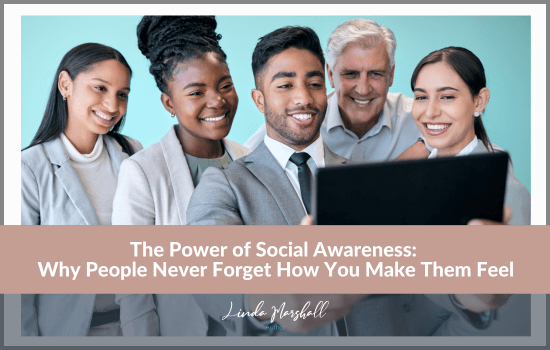Years ago, someone did something so small I barely noticed it, until I realized I never forgot how it made me feel. That’s the quiet strength of social awareness and the lasting impact of kindness and connection.
“People will forget what you said, people will forget what you did, but people will never forget how you made them feel.” — Maya Angelou
The Lasting Impact of Your Presence: How Social Awareness Shapes Relationships
Social awareness is the ability to recognize and appropriately respond to the emotions of others, is a key pillar of emotional intelligence. It involves more than just noticing feelings; it calls for empathy, active listening, and the intention to make others feel seen and valued. Whether at work, with friends, or in brief daily encounters, social awareness shapes how others perceive and remember us. We may forget conversations and tasks, but we rarely forget meaningful connections, or the absence of them.

By cultivating empathy, active listening, and emotional intelligence, we can create more meaningful, trusting, and impactful interactions. This blog explores the power of social awareness and how mastering it can improve communication, enhance relationships, and leave a lasting impression.
What Is Social Awareness?
Social awareness goes beyond simply noticing someone’s mood. It’s about tuning into emotions, listening deeply, and making thoughtful choices in how we respond. When we lead with empathy and intention, we make others feel seen, valued, and understood.
1. Social Awareness Strengthens Relationships
When we are socially aware, we build deeper, more authentic relationships. People feel heard and respected, which fosters mutual trust and emotional safety.
Example: Sarah, a team leader, noticed that one of her colleagues, James, had been unusually quiet in meetings. Instead of assuming disengagement, she pulled him aside to check in. James revealed he was struggling with a personal issue. Sarah’s empathy and willingness to listen strengthened their professional bond and made James feel supported at work.
2. It Enhances Communication
Being attuned to nonverbal cues, tone of voice, and underlying emotions helps us communicate more effectively. Social awareness allows us to respond with care rather than react out of habit or defensiveness.
Example: During a client presentation, Alex sensed hesitation from a potential customer. Rather than rushing through his pitch, he paused and asked, “Do you have any concerns about this approach?” This small gesture made the client feel heard, and Alex was able to address the concerns directly, ultimately securing the deal.
3. It Creates a Lasting Impact
People may not remember your exact words, but they will remember how you made them feel. A single moment of kindness or understanding can influence someone for years.
Example: As a child, Maria was terrified on her first day at a new school. Jenna, a classmate, invited her to sit at her table. Decades later, Maria still remembers that one simple act of kindness. It shaped her entire experience and left a lifelong impression.
4. It Improves Conflict Resolution
Recognizing others' emotions can help us navigate disagreements with greater compassion and objectivity. Social awareness helps us de-escalate tensions and find solutions that respect different perspectives.
Example: During a tense team discussion, Mark noticed his colleague, Lisa, becoming defensive. Instead of pushing his point, he acknowledged her frustration and asked her to share her thoughts. This approach diffused the tension and helped them arrive at a collaborative solution.
5. It Promotes Inclusivity and Belonging
Being mindful of others’ experiences helps create spaces where people feel seen, heard, and included. Socially aware individuals foster environments of psychological safety and connection.
Example: At a company event, Jordan noticed that a new hire, Priya, was standing alone. He introduced her to colleagues and made her feel welcome. This small gesture helped Priya integrate into the team more confidently.
Lead with Empathy
Social awareness isn’t just about noticing, it’s about responding in a way that uplifts and connects. Whether in the boardroom, breakroom, or your living room, the emotional impression you leave is your legacy.
By practicing empathy, active listening, and emotional intelligence, you build stronger relationships, earn trust, and make a lasting difference. How you make people feel is the true measure of your impact.
Ready to Take the Next Step?
By developing emotional intelligence, you can proactively recognize and navigate workplace triggers, build resilience, and elevate your leadership presence. For deeper insights into cultivating emotional intelligence, explore Linda Marshall’s books:
-
📘 The Mindful Journal: Cultivating Emotional Intelligence through Reflective Writing
-
📗 The Power of Emotion: A Practical Guide to Making the Most of Your Emotional Intelligence
Interested in going further? Through her company, Marshall Connects, Linda Marshall offers Emotional Intelligence Assessment & Coaching Services to support your growth journey. Discover how to begin today.
Get Social With Linda Marshall and Share
INSTAGRAM @LindaMarshallAuthor | FACEBOOK @LindaMarshallAuthor


